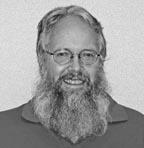“Nature Boy” Lived in Big Tujunga Canyon
“There was a boy, a very strange enchanted boy…”
These were the opening lines of Nat King Cole’s hit song, “Nature Boy.” The song was a semi-autobiographical piece written by the famous Los Angeles pre-hippie icon Eden Ahbez, whose main home (campsite really) was in Big Tujunga Canyon.

president of the Historical Society
of the Crescenta Valley and loves local history. Reach him at
lawlerdad@yahoo.com.
Eden was born in the slums of New York in 1908 as George Alexander Aberle (Eden Ahbez was a name he adopted in the early ’40s). He grew up in an orphanage, but was adopted as a teenager by a family in Kansas. In the 1930s he developed his musical talent in Kansas City and New York. He joined the thousands of jobless men who lived in vagabond style, crisscrossing the country by rail, thumb and foot. During this period he read up on Eastern philosophy and the nutritional benefits of natural foods.
In 1941 he landed in L.A. and got a job playing piano in a health food restaurant called Eutropheon on Laurel Canyon Boulevard. Eutropheon was one of the centers of the proto-hippie lifestyle of that era that promoted primitive living and raw foods. (L.A. had, since the 1880s, been a center of the health food movement. We had a health food store in Montrose in the ’20s!) Eden was influenced by the owners of the restaurant, natural-lifestyle pioneers John and Vera Richter. Eden and others associated with the restaurant adopted Eastern philosophies, grew their hair and beards, wore robes, and camped outdoors, eating only raw foods (the famous Gypsy Boots was one of this group). They were dubbed “the California Nature Boys.”
The years just after the war found Eden regularly camping with his new wife Anna in Big Tujunga Canyon. Old-timers place that site as being between the modern-day Little League field and the detention camp. In 1947, Eden penned “Nature Boy” and tried to get the sheet music to the moderately successful Nat King Cole, then playing in a Los Angeles theater. The long-haired oddball was ignored, but he left the music with Cole’s assistant. Later, when Cole read the music, he was taken with its haunting melody, and tried the song out to live audiences with great success. Cole wanted to record the song, but needed to get the rights from Eden who had disappeared back into his temporary campsites around L.A. Legend says that Cole finally tracked him down camped under the Hollywood sign. The song was a No. 1 hit for Cole, and introduced him to a wider audience, cementing his fame.
As a result of Cole’s hit, Eden became a celebrity, and his then-odd lifestyle became a focus of a fascinated America. The term “nature boy” became a part of our language and culture. Photos of him, his wife and son preparing raw foods or playing bongo drums in Big Tujunga Canyon were widely viewed. Characters based on “Nature Boy” popped up in movies, pro-wrestling, Bugs Bunny cartoons and comic books. As a result of his fame, other musicians and songwriters flocked to Eden. He churned out a string of minor hits for Doris Day, Frank Sinatra, Eartha Kitt and many others. His songwriting ranged from the easy-listening style of “Nature Boy” to jazz, rock ‘n roll, and country western. He even collaborated (un-credited) with songwriter Stan Jones on the cowboy classic “Ghost Riders in the Sky.”
All this time, he was camping outdoors in various sites ranging from Silver Lake and Whittier to Joshua Tree and Indio, but returning often to Big Tujunga. In the ’50s and ’60s, American culture caught up with Eden, first with the beatnik movement then with the hippie movement. Life’s tragedies caught up with him as well when his wife died in 1965 of leukemia, followed by his son in 1971 in a drowning accident. Eden himself died in a car crash in 1995.
Eden Ahbez’s physical life was filled with pain and tragedy, but his mind and spirit existed above it all, always promoting a message of peace and tranquility.
“The greatest thing you’ll ever learn, Is just to love and be loved in return.”
